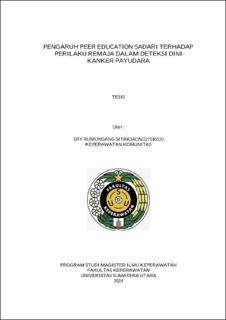Pengaruh Peer Education SADARI terhadap Perilaku Remaja dalam Deteksi Dini Kanker Payudara
The Influence of SADARI Peer Education on Adolescent Behavior in Early Detection of Breast Cancer

Date
2024Author
Sitindaon, Sry Rumondang
Advisor(s)
Nasution, Siti Zahara
Nurhidayah, Rika Endah
Metadata
Show full item recordAbstract
Adolescence is a transitional period from childhood to adulthood, marked by physical and psychological development. Generally, adolescents exhibit inadequate attitudes towards the prevention and treatment of non-communicable diseases, such as breast cancer. Thus, early detection methods are essential. One such method is Breast Self-Examination (SADARI). This study aims to analyze the influence of SADARI peer education on adolescent behavior in the early detection of breast cancer. The research methodology employed is quantitative research with a pre-experimental one-group pretest-posttest design. The sampling technique used is proportional stratified random sampling, yielding a sample size of 114 respondents. The study respondents are female adolescents in their first year at the Santa Elisabeth School of Health Sciences, Medan, class of 2023. Data were collected using questionnaires to assess knowledge, attitudes, and practices. Data analysis was performed using the Wilcoxon signed-rank test. The study results indicate that SADARI peer education significantly influences adolescent behavior in the early detection of breast cancer, with a p-value of 0.000 < 0.05. The conclusion of this study is that SADARI peer education can enhance adolescent behavior (knowledge, attitudes, and practices) in the early detection of breast cancer and is recommended as an independent nursing intervention to disseminate health information among adolescents.
Collections
- Master Theses [486]
